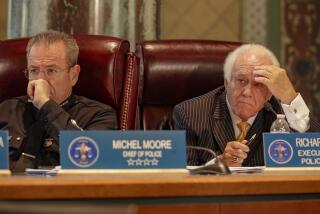Gardena Extends New-Hotel Ban Despite Plea From Club Owners
A spokesman for the owners of the now-closed Horseshoe Club poker casino told Gardena City Council members this week that plans to develop the club site could be delayed if the city extends its moratorium on new hotel and motel construction.
Nonetheless, the council voted unanimously Tuesday to extend the moratorium, imposed last September, for another year while the city staff continues to study whether Gardena needs to restrict the size and number of its hotels and motels.
‘Too Many’ Motels
“The intent of the ordinance is a good one and a needed one,” said Councilman Mas Fukai. “I think we have too many (motels) in this town, and I don’t want to see any more. Unless we do this now, we are going to have a hotel we don’t need in every block of this city.”
The city staff is studying land-use issues, including a possible requirement for a minimum lot size for new hotels, City Manager Kenneth Landau said. The report will probably be completed and submitted to the Planning Commission within 90 days, he said.
The moratorium was imposed as an urgency ordinance last year after residents complained that small motels were attracting crime and prostitution in northern Gardena, near an unincorporated Los Angeles County area along Western and Rosecrans avenues.
The city had also received similar complaints from residents in the Vermont Avenue area, next to the Harbor Gateway district of Los Angeles.
The moratorium does not apply to hotel or motel projects that were already under construction or had been approved before the ban was first imposed. Such projects include the proposed $56-million Eldorado Center hotel near the site of the Eldorado Club, city officials said.
James W. Hatch, a Gardena businessman and one of 92 partners who own the Horseshoe Club, was the sole speaker to address the council during the public hearing on the moratorium.
Hatch told the council that the Horseshoe property, at Vermont and Rosecrans avenues, is up for sale and that the partnership is hoping to offer it for development as a 16-story, 200- to 250-room hotel, with an 80-table poker casino on the top floor.
Saying the partnership is “struggling with the moratorium,” Hatch expressed concern that extending the ban could hamper the group’s development plans.
Certificates Expired
“The problem facing the club is use of the property,” Hatch said. “We would like to be able to bring a brand new hotel-casino into the city . . . appealing to higher-game players from West Los Angeles and across town.”
Hatch told the council that the group is unable to operate a casino at the site because the partnership’s 92 members are working on renewing their expired gaming registration certificates, which are issued by the state.
Noting that the group has yet to renew the certificates or produce a final architectural design for the hotel project, Councilman James Cragin said the moratorium would be unlikely to hinder its plans.
“I don’t believe it will be a roadblock,” Cragin told Hatch.
Landau said the city’s main concern in imposing the ordinance has been an “over-proliferation of small motels,” including “flophouse types of hotels.”
Since the moratorium was imposed last year, the city has used other methods to curtail problems stemming from prostitution near some smaller motels.
Residents and merchants say the situation has improved.
Mack Naylor, a Vermont Avenue resident, told the council Tuesday that increased patrols and arrests by the Gardena Police Department have greatly reduced the number of prostitutes on the street.
In a one-day sweep Aug. 25, Gardena police made 21 prostitution arrests on Vermont Avenue.
“The Gardena police swept that street clean,” Naylor said. “The prostitutes have moved to the Los Angeles side.”
Recent prostitution sweeps of the so-called Rosecrans Corridor, the unincorporated county area in northern Gardena near Western Avenue, also appear to have curtailed the problem.
In separate undercover sweeps in August, Gardena police and the Los Angeles County Sheriff’s Department made 125 arrests on Western Avenue, mostly of men who were charged with soliciting, officials said.
More to Read
Sign up for Essential California
The most important California stories and recommendations in your inbox every morning.
You may occasionally receive promotional content from the Los Angeles Times.









